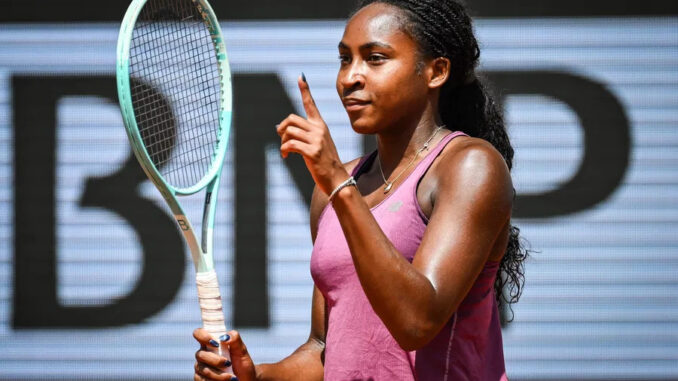
The rise of Coco Gauff in the world of tennis has been nothing short of meteoric, but her impact extends far beyond the baseline. As a young Black athlete, Gauff has consistently used her burgeoning platform to address pressing issues within the Black community and to celebrate her rich heritage, demonstrating a maturity and conviction that belies her years. Her commitment to social justice is deeply personal, rooted in her family’s history and her own experiences, making her a powerful voice for change in the sporting world and beyond.
Gauff’s dedication to uplifting her community was recently exemplified by a significant $100,000 donation to the United Negro College Fund (UNCF). This generous contribution is earmarked for the establishment of the Coco Gauff Scholarship Program, specifically designed to provide financial support for student-athletes pursuing competitive tennis at Historically Black Colleges and Universities (HBCUs). This initiative is particularly impactful as it positions Gauff as one of the youngest major gift donors in the UNCF’s 80-year history.
For Gauff, this act of philanthropy is not merely a charitable gesture; it’s a profound connection to her roots. She openly shared the deep-seated ties her family has to HBCUs, explaining, “My family has a deep-rooted history with HBCUs, going all the way back to my great, great grandfather. From aunts and uncles to cousins, HBCUs have played a huge role in shaping who we are.” This personal connection underscores her desire to ensure that future generations have the same opportunities that her family valued.
Her motivation stems from a powerful understanding of representation. “As a young Black athlete, I understand how impactful it is to see people who look like me thriving in both sports and education,” she articulated. This sentiment highlights the importance of visibility and inspiration for aspiring Black tennis players. Gauff’s hope is that this scholarship will empower more young Black individuals to pursue their passions, both on the court and in the classroom: “I want to help the next generation of student-athletes continue pursuing their passion for tennis while reaching their academic goals. My hope is that this scholarship gives more young Black players the confidence to chase their dreams, knowing they have a strong community behind them and a bright future ahead.”
Beyond her financial contributions, Gauff has consistently used her voice to speak out on racial issues and advocate for broader social justice. Her activism gained significant attention in 2020, when, at just 16 years old, she delivered a powerful and poignant speech at a Black Lives Matter protest in her hometown of Delray Beach, Florida. The stark reality of her presence there, protesting the very same injustices her grandmother had fought against decades earlier, resonated deeply. “I think it’s sad that I’m here protesting the same thing that she did 50-plus years ago,” she stated then, a stark reminder of the enduring fight for equality.
Gauff’s message at that protest was clear and uncompromising: “If you are choosing silence you are choosing the side of the oppressor.” She urged individuals to engage in “tough conversations” with friends and to take action, emphasizing the power of the vote in shaping the future. Her conviction that “Black lives have always mattered — they mattered then, they matter now and they will matter in the future” has become a consistent theme in her public discourse.
Her willingness to engage with complex social and political issues, even at a young age, has set her apart. She has voiced dissatisfaction “with the current state of our government” and encouraged people to vote, particularly in her home state of Florida, where controversies surrounding book bans have sparked widespread debate. Gauff believes that athletes, especially those with a platform, have a responsibility to speak out. As she once articulated, “Obviously tennis is the main priority. Once I step off the court, I’m a person. I’m not hitting strokes while I’m eating food and everything. I’m actually thinking. I’m a person. I have opinions. I have thoughts. I feel like I have a responsibility with the platform tennis has given me to not use it in vain.”
Gauff’s activism is not merely a fleeting interest; it is deeply ingrained in her identity and her understanding of her role in the world. Being named to TIME’s annual Women of the Year list further acknowledged her influence beyond her athletic achievements, recognizing her as an “extraordinary leader fighting for a more equal world.” Her grandmother’s pioneering efforts in integrating schools in Florida in 1961 have clearly shaped Gauff’s perspective, instilling in her a profound sense of purpose.
In a sport that has historically seen a lack of diversity, Gauff, alongside other talented Black athletes like Frances Tiafoe, Sloane Stephens, and Taylor Townsend, is actively reshaping the narrative of American tennis. Her success on the court, culminating in her 2023 US Open women’s singles title, provides a powerful visual for young Black children, demonstrating that they too can excel at the highest levels of the sport.
Coco Gauff is more than just a tennis prodigy; she is a beacon of hope and a champion for social change. Her unwavering commitment to addressing the problems faced by the Black community, combined with her pride in her heritage, solidifies her legacy as a transformative figure who is not only changing the face of tennis but also inspiring a generation to use their voices for a more just and equitable world.
Leave a Reply